高中英语牛津译林必修2 Unit3 Amazing people Word power and grammar过去完成时(课件)
文档属性
| 名称 | 高中英语牛津译林必修2 Unit3 Amazing people Word power and grammar过去完成时(课件) | 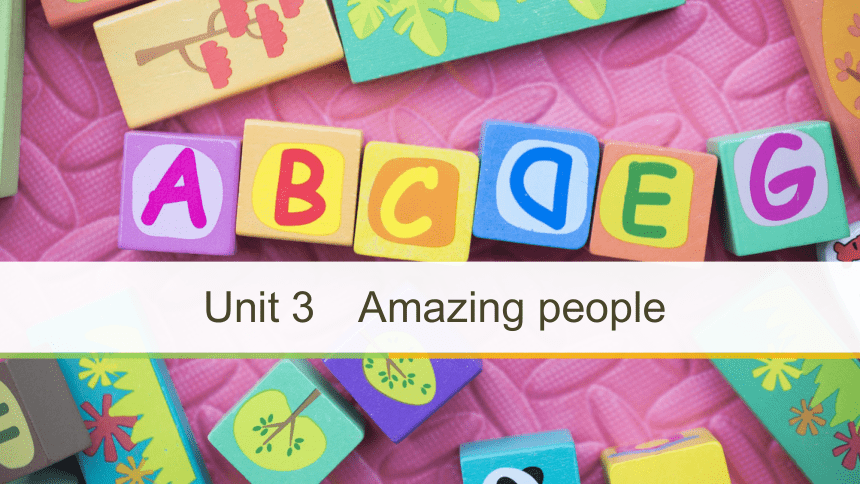 | |
| 格式 | zip | ||
| 文件大小 | 1.7MB | ||
| 资源类型 | 教案 | ||
| 版本资源 | 牛津译林版 | ||
| 科目 | 英语 | ||
| 更新时间 | 2019-02-24 09:29:56 | ||
图片预览

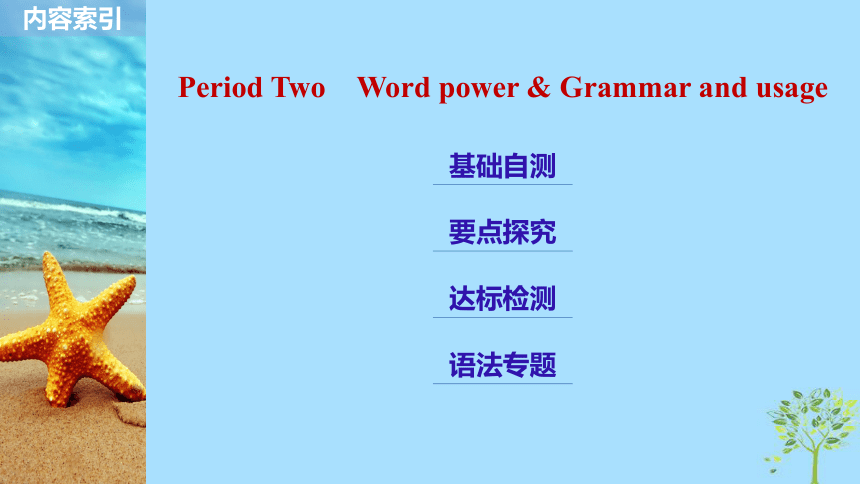

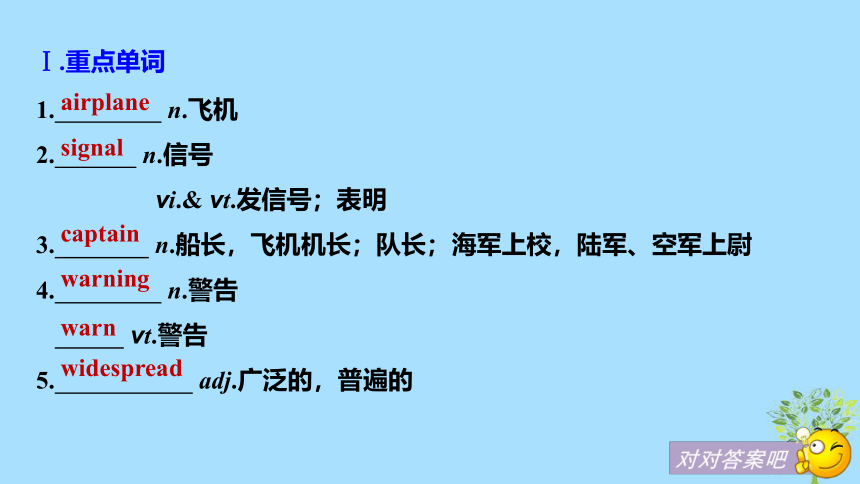

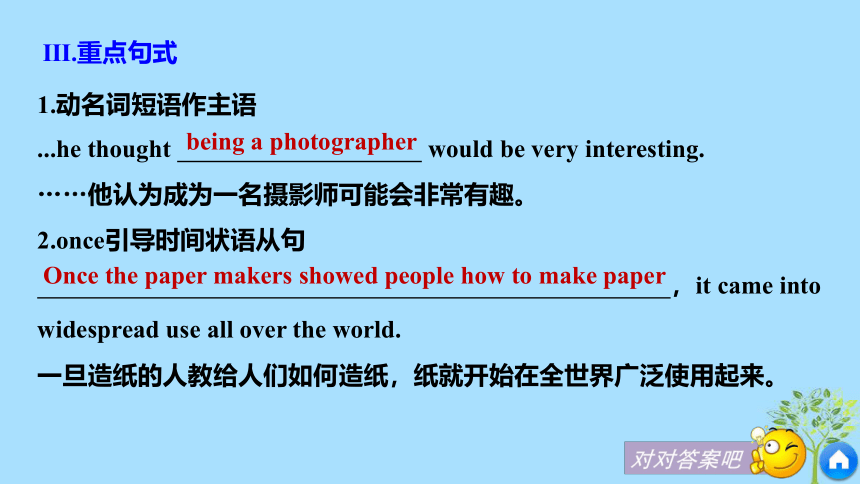

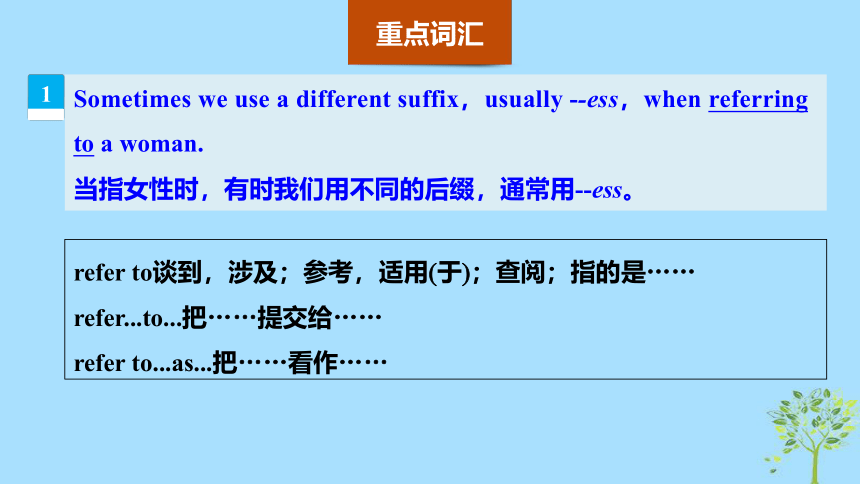
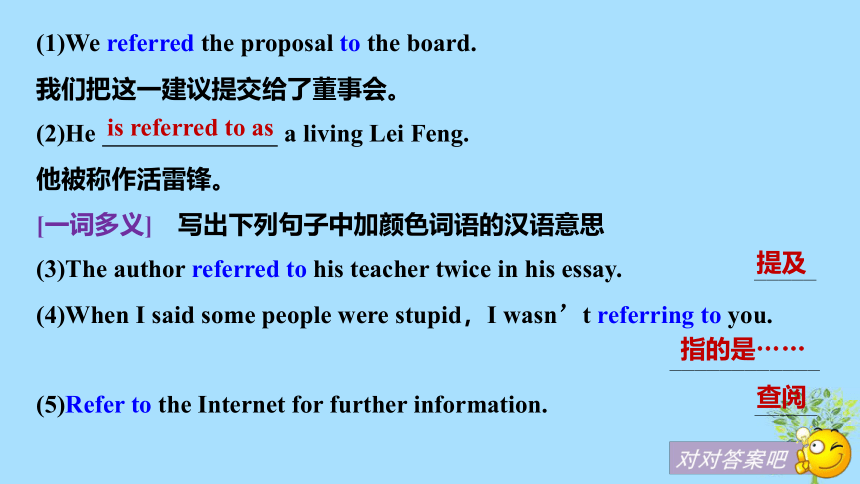
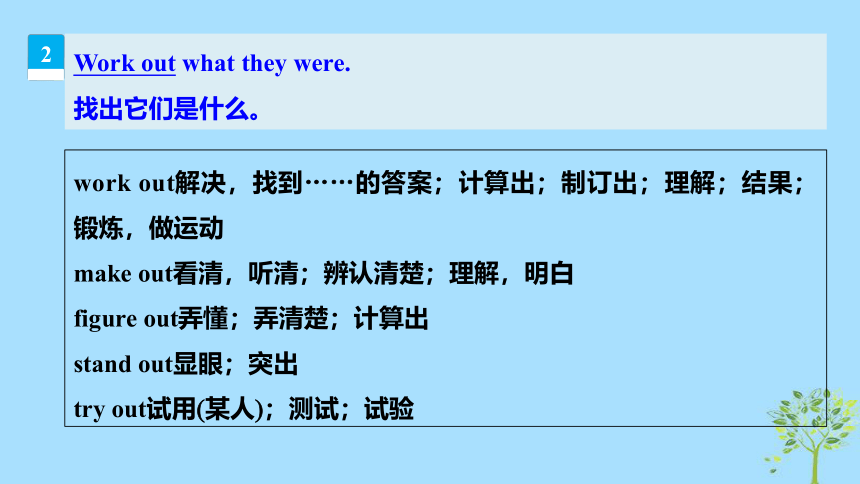
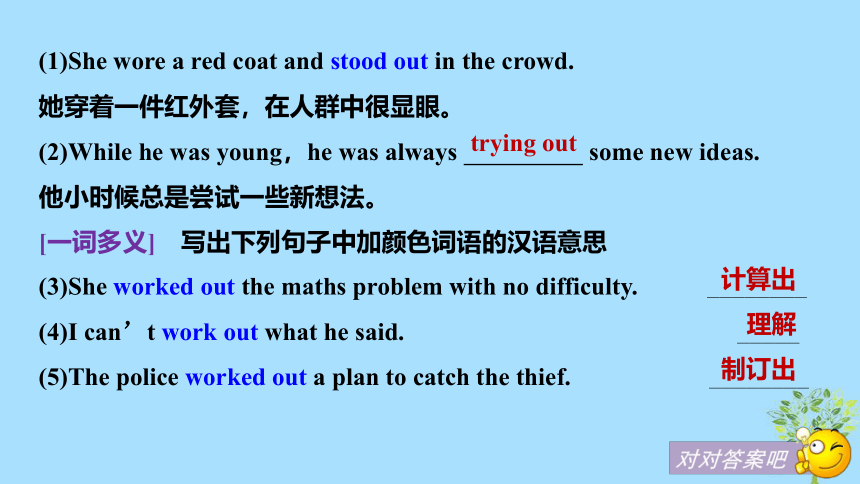
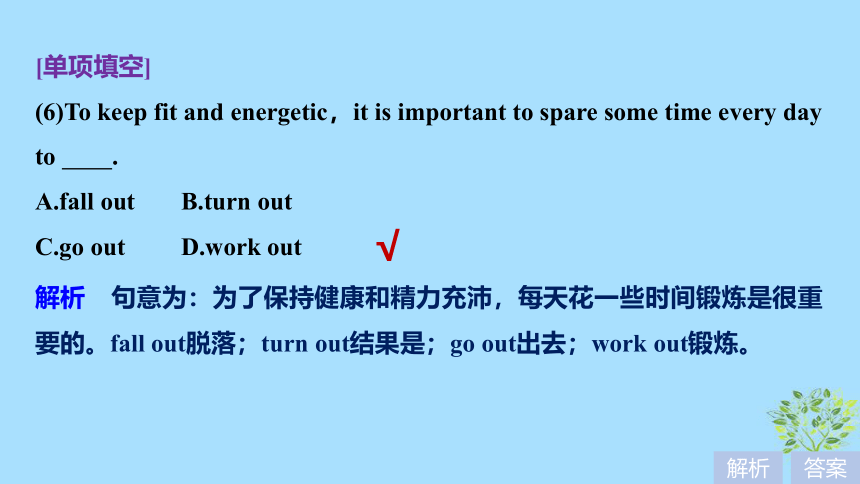
文档简介
课件65张PPT。Unit 3 Amazing people基础自测内容索引要点探究达标检测语法专题Period Two Word power & Grammar and usage基础自测1. n.飞机
2. n.信号
vi.& vt.发信号;表明
3. n.船长,飞机机长;队长;海军上校,陆军、空军上尉
4. n.警告
vt.警告
5. adj.广泛的,普遍的airplanesignalcaptainwarningwarnwidespreadⅠ.重点单词1. 谈到,涉及;参考
2. 解决;算出;找到……的答案
3. 梦见;渴望
4. 与……取得联系
5. 开始使用Ⅱ.重点短语refer towork outdream ofget in touch withcome into use1.动名词短语作主语
...he thought would be very interesting.
……他认为成为一名摄影师可能会非常有趣。
2.once引导时间状语从句
,it came into widespread use all over the world.
一旦造纸的人教给人们如何造纸,纸就开始在全世界广泛使用起来。Ⅲ.重点句式being a photographerOnce the paper makers showed people how to make paper要点探究Sometimes we use a different suffix,usually --ess,when referring to a woman.
当指女性时,有时我们用不同的后缀,通常用--ess。refer to谈到,涉及;参考,适用(于);查阅;指的是……
refer...to...把……提交给……
refer to...as...把……看作……重点词汇(1)We referred the proposal to the board.
我们把这一建议提交给了董事会。
(2)He a living Lei Feng.
他被称作活雷锋。
[一词多义] 写出下列句子中加颜色词语的汉语意思
(3)The author referred to his teacher twice in his essay. _____
(4)When I said some people were stupid,I wasn’t referring to you.
____________
(5)Refer to the Internet for further information. _____is referred to as提及指的是……查阅Work out what they were.
找出它们是什么。work out解决,找到……的答案;计算出;制订出;理解;结果;锻炼,做运动
make out看清,听清;辨认清楚;理解,明白
figure out弄懂;弄清楚;计算出
stand out显眼;突出
try out试用(某人);测试;试验(1)She wore a red coat and stood out in the crowd.
她穿着一件红外套,在人群中很显眼。
(2)While he was young,he was always some new ideas.
他小时候总是尝试一些新想法。
[一词多义] 写出下列句子中加颜色词语的汉语意思
(3)She worked out the maths problem with no difficulty. ________
(4)I can’t work out what he said. _____
(5)The police worked out a plan to catch the thief. ________ trying out计算出理解制订出[单项填空]
(6)To keep fit and energetic,it is important to spare some time every day to .
A.fall out B.turn out
C.go out D.work out√答案解析解析 句意为:为了保持健康和精力充沛,每天花一些时间锻炼是很重要的。fall out脱落;turn out结果是;go out出去;work out锻炼。sent last radio signal
发出了最后的无线电信号signal n.信号;vt.& vi.发信号
a danger/warning signal危险/警告信号
traffic signals交通信号灯
signal (to) sb. to do sth. 示意某人做某事
signal to sb. 向某人示意
signal (sb. ) that...示意(某人)……(1)Tom signaled to the waiter for the bill.
汤姆示意服务员结账。
(2)He raised his arm .
他抬起手臂示意我们停下。 to signal us to stop[易混辨析] signal,sign,symbol,mark
※signal指为某一目的而有意发出的信号。
※sign表示“告示,标记”时,侧重指用图形、文字等所表达的内容,另外还可指“征兆,迹象”。
※symbol指作象征或表达某种深邃意蕴的特殊事物。
※mark普通用词,含义广泛。既可指为便于辨认而有意做的标记,又可指自然形成的标记或有别于其他事物的特征。还可以指污点、污渍、分数、成绩等。[选词填空] signal,sign,symbol,mark
(3)The dove is the of peace.
(4)Every coat in the shop has a price sewn on it.
(5)He ignored the traffic and caused the accident.
(6)Sir,you are not allowed to walk your pet on the lawn.Don’t you see the :“Keep off the grass”?symbolmarksignalssign[单项填空]
(7)In order not to be heard,she pointed her finger upwards to ______
that someone was moving about upstairs.(2015·湖北,24)
A.whisper B.signal
C.declare D.complain答案解析解析 句意为:为了不让别人听到自己的声音,她竖起手指示意有人正在楼上走动。根据题干中的pointed her finger upwards可知,她只是竖起手指示意,并没有出声。signal示意,符合句意。whisper低语;declare宣布;complain抱怨。√The captain,who had received warnings about icebergs all day,had dismissed the warnings as they arrived.
船长全天都收到冰山警告,但却对到来的警告疏于注意。(1)warning n.警告;预告,预兆
(2)warn vt.警告
warn sb. of sth. 警告某人提防某事
warn sb. not/never to do sth. 警告某人不要做某事
warn sb. against doing sth. 警告某人不要做某事(1)Doctors issued a warning against eating any fish caught in the river.
医生们发出警告:不要吃从那条河里捕的鱼。
(2)I the risk,didn’t I?
我警告过你那有危险,对不对?warned you of[单项填空]
(3)During the period of recent terrorist activities,people not to touch the unattended bag.
A.had always been warned
B.were always being warned
C.are always warning
D.always warned答案解析√解析 句意为:在最近的恐怖活动期间,人们总是被警告不要去碰任何无人照看的包。people与warn之间为被动关系,所以排除C和D;
had always been warned为过去完成时,表示“过去的过去”,而语境中没有任何这种时态的提示,也应排除。
warn sb. not to do sth. 意为“警告某人不要做某事”,同时,always用在进行时中也表示了说话者的抱怨、不满情绪,故选B。Once the paper makers showed people how to make paper,it came into widespread use all over the world.
一旦造纸的人教给人们如何造纸,纸就开始在全世界广泛使用起来。come into use开始使用
come into force开始生效
come into existence开始存在
come into fashion开始流行(1)When did the train come into use?
这列火车什么时候开始使用的?
(2)When do the new regulations ?
新规章什么时候开始生效?
(3)How did the universe first ?
宇宙最初是怎么形成的?
(4)Long skirts have again.
长裙子又开始流行起来了。come into forcecome into existencecome into fashion经典句式Once the paper makers showed people how to make paper,it came into widespread use all over the world.
一旦造纸的人教给人们如何造纸,纸就开始在全世界广泛使用起来。(1)句中once作连词,引导时间状语从句,意为“一旦;一……就……”,其中how to make paper是“疑问词+to do”作宾语。
(2)once引导时间状语从句:①如果主句表示将来的含义,从句常用一般现在时表将来,即“主将从现”。②若从句主语与主句主语一致,且从句谓语含有be动词时,可将从句主语与be动词一起省略。(1)Once I look up something on the Internet,I don’t need to keep all the details for future use.
一旦我在网上查东西,就不需要保存所有的细节以备将来使用了。
(2) ,you will never forget it.
一旦你听了这首歌,就永远忘不了它。
(3) ,his face is never forgotten.
一旦认识,他的面容让人永生难忘。Once you have heard the songOnce(his face is) known[单项填空]
(4)I believe you will have a wonderful time here you get to know everyone else.(2015·陕西,20)
A.though B.as if
C.once D.so that答案解析解析 句意为:一旦你在这儿认识了其他所有人之后,我相信你会在这儿有一段美好的时光。once一旦,符合句意。√达标检测Ⅰ.词形变换
1.The woman went to see the accident to satisfy her (curious).
2.It is said that his father used to be a famous (explore).
3.The driver was driving very fast,ignoring the (warn).
4.The police are responsible for the (preserve) of law and order.
5.The thief was lucky,for he escaped (punish).curiosityexplorerwarningpreservationpunishmentⅡ.完成句子
6.决定一经做出,我们所有人都应该坚持它。
,all of us should stick to it.
7.经过艰苦努力,她实现了当一名女演员的理想。
After hard efforts,she an actress.
8.他总是第一个来上班的人。
He is always to work.Once a decision has been maderealized her dream of/about becomingthe first person to come9.每天早晨做运动有助于人的健康。
helps make one healthy.
10.我认为杰克与他的同事们相处得不是很好。
Jack’s getting along well with his colleagues.Taking exercise every morningI don’t thinkⅢ.单项填空
11.It is 8 o’clock.Tom should have arrived here,but he still hasn’t .
A.turned on B.turned up
C.got over D.referred to答案解析解析 句意为:八点钟了,汤姆本该到这里了,但是他还没有出现。turn on打开;turn up出现;get over克服;refer to查阅。根据句意可知选B项。√12.Here is my card.Let’s keep in .
A.touch B.relation
C.connection D.friendship√答案解析解析 touch作名词时构成短语keep in touch,意为“保持联系”。13. you lose confidence,you can never expect to do your work well.
A.While B.Before C.Once D.Unless√答案解析解析 句意为:一旦你失去信心,就别想能把工作做好了。once一旦,符合句意。14.In our class,when the bell rang and the teacher closed his book,it was a for everyone to stand up.
A.signal B.chance
C.mark D.measure√答案解析解析 signal信号;chance机会;mark记号;measure措施。句中it代替“铃响时老师合上书”这件事,而“它”正是大家要起立的“信号”。解析 句意为:我警告他会遇到对手。warn警告,告诫;warn sb. of sth. 警告某人提防某事。threaten威胁,恐吓;treat对待;thread穿针,穿过。15.I him of the opposition he would meet.
A.warned B.threatened
C.treated D.threaded√答案解析语法专题◆语法感知过去完成时;现在完成时与过去完成时的区别用所给词的正确形式填空
1.We (plan) to play football,but it rained heavily.
2.No sooner he (arrive) than the trouble started.
3.I (travel) to most of the cities in China since five years ago.
4.The boy (not,watch) the movie last night because he ____________(watch) it twice.
5.The train (not,go) yet.had plannedhadarrivedhave traveleddidn’t watchhad watchedhasn’t gone◆语法精析一、过去完成时的用法
过去完成时由“had+过去分词”构成,其用法较复杂,在使用过程中应特别注意以下几个方面:
1.过去完成时可用来表示:
(1)过去某一时刻或动作以前已完成的动作或存在的状态。
The play had already been on when we got to the theatre.
我们到达剧院时戏已经开演了。(2)某些动词的过去完成时表示过去未实现的计划或愿望。常用的这类动词有:hope,expect,suppose,think,want,intend,mean,plan等。
I had thought that we were going to be invited to dinner.
我本来以为我们会被邀请去吃饭的。2.过去完成时中的“过去时间”可由下列结构表示:
(1)after,before,by,until等构成的介词短语。
(2)after,as soon as,before,since,when,until等引导的时间状语从句。
(3)already,yet,ever,before,never等副词(作状语)。
I recognized the man at once,because I had seen him before.
我一下子就认出了这个人,因为我以前见过他。
She didn’t go to bed until her son had finished his homework.
直到她儿子写完家庭作业她才去睡觉。
When I called on her,she had been ill for two weeks.
我去看她时,她已生病两个星期了。3.在含有as soon as,after,before,when,until等表示过去时态的复合句中,若主、从句动作不同时发生,先发生的就用过去完成时;若一个动作紧接着另一个动作发生或两个动作几乎同时发生,则皆用一般过去时。
He died before I had (had) a chance to speak to him.
我还没来得及跟他说话,他就死了。
4.在“It was the first/second...time+从句”结构中,从句必须使用过去完成时。
It was the first time he had come to China.
这是他第一次来中国。5.在hardly/scarcely/rarely...when...和no sooner...than...等结构中,主句使用过去完成时。
I had hardly got into the car when I heard a man call my name.
我刚跨进车子就听见有一名男子叫我的名字。
She had no sooner seen her lost child than she began to cry.
她一见到她那丢/走失的孩子就哭了起来。
6.在表示过去动作先于主句动作发生的定语从句中,用过去完成时。
But the finger I put into my mouth was not the one I had dipped into the cup.
但是我放进嘴里的手指并不是我在杯子里蘸了一下的那个手指。7.在时间、条件状语从句中,用过去完成时代替过去将来完成时。
I knew she would wait long at the school gate until the class had finished.
我知道她将在校门口等很长时间直到下课。二、现在完成时与过去完成时的区别
1.现在完成时表示过去动作对现在造成的影响或结果,强调的是现在的状况。
The car has arrived.
车已经来了。
Someone has broken the window.
有人把窗户打破了。2.过去完成时表示“过去的过去”,即表示在过去某一时间或某一动作之前完成的动作或存在的状态,是以过去某一时间为基准。
How long had Mr Wang taught in the middle school before he came here?
王先生来这里之前,在中学教了多长时间?
The machine went much better after it had been oiled.
上过油之后机器运转得好多了。1.In the 1950s in the USA,most families had just one phone at home,and wireless phones yet.(2017·北京,29)
A.haven’t invented
B.haven’t been invented
C.hadn’t invented
D.hadn’t been invented√答案解析◆高考链接12345671089解析 句意为:在20世纪50年代的美国,大多数家庭家里仅有一部电话,无线电话还没有被发明出来。由in the 1950s可知句子说的是过去发生的事情,又由yet可知,要用完成时,故空格处用过去完成时;又因phones与invent之间是被动关系,所以用被动语态。综合可知,选D项。123456710892.When walking down the street,I came across David,whom I ______
for years.(2016·天津,3)
A.didn’t see B.haven’t seen
C.hadn’t seen D.wouldn’t see答案解析解析 考查动词的时态。句意为:沿街散步时,我偶然遇到了戴维,我们已有好几年没见了。“没见”表示的动作在came across之前,且for years是完成时的标志,所以应选表示过去完成时的hadn’t seen。√123456710893.Silk one of the primary goods traded along the Silk Road by about 100 BC.(2016·浙江,9)
A.had become B.was becoming
C.has become D.is becoming答案解析解析 考查动词的时态。句意为:到大约公元前 100 年时,丝绸就已成为沿丝绸之路进行交易的主要货物之一。“by+过去时间”作状语,谓语应用过去完成时态。根据句意可知选A。√123456710894.Just as I got to the school gate,I realized I my book in the café.(2015·安徽,24)
A.have left B.had left
C.would leave D.was leaving√答案解析解析 考查动词的时态。 句意为:我刚一到学校门口,就意识到我把书落在咖啡馆了。realized后省略了that,这里是一个宾语从句,从句时态与主句保持一致,“落下”的动作发生在“意识到”之前,应该用过去完成时,故选B。123456710895.—Did you have difficulty finding Ann’s house?
—Not really.She us clear directions and we were able to find it easily.(2015·北京,27)
A.was to give B.had given
C.was giving D.would give√答案解析解析 考查动词的时态。句意为:——你们找到安的家有困难吗?
——不是很难,她已经给了我们清晰的指引,我们很容易就找到它了。由句意可知give这一动作发生在“我们找安的家”之前,是发生在“过去的过去”,故用过去完成时。123456710896.In the last few years,China great achievements in environmental protection.(2015·北京,26)
A.has made B.had made
C.was making D.is making√答案解析解析 考查动词的时态。句意为:在最近的几年里,中国在环境保护方面已经取得了巨大的成就。 由“in the last few years”可知,此处应用现在完成时。123456710897.Writing out all the invitations by hand was more time--consuming than we .(2014·山东,1)
A.will expect B.are expecting
C.expect D.had expected答案解析解析 考查动词的时态。句意为:手写所有的邀请函比我们预计的更费时。“预计”发生在“手写邀请函”之前,而“手写邀请函”是一个过去的事实,故“预计(expect)”这个动作应用过去完成时态。√123456710898.The twins,who their homework,were allowed to play badminton on the playground.(2014·安徽,23)
A.will finish B.finish
C.have finished D.had finished√答案解析解析 考查动词的时态。句意为:已完成家庭作业的这对双胞胎被允许到操场上打羽毛球。根据语境可知,“完成家庭作业”是在were allowed之前发生的动作,属于“过去的过去”,应使用过去完成时态。123456789109.During his stay in Xi’an,Jerry tried almost all the local foods his friends .(2014·陕西,22)
A.would recommend B.had recommended
C.have recommended D.were recommending√答案解析解析 考查动词的时态。所填词动作发生在tried动作之前,即表“过去的过去”,用过去完成时,故选B项。1234567891010.I found the lecture hard to follow because it when I arrived.
(2014·北京,32)
A.started B.was starting
C.would start D.had started√答案解析解析 考查动词的时态。句意为:我觉得很难听懂这堂讲座了,因为我到的时候它已经开始了。由hard to follow可知,start的动作发生在“我”到达之前,arrive的动作在过去发生,故此处表示发生在“过去的过去”,用过去完成时态。12345678910◆达标检测Ⅰ.用所给词的正确形式填空
1.There (be) 25 parks in our city up till 2016.
2.A quarrel didn’t break out as he (expect).
3.She already knew the secret but no one (tell) her.
4.I (intend) to see you but I was too busy.
5.Every means (try) to solve the problem since last week.
6.She said she (see) the film before.
7.No sooner I (go) out than he came to see me.had beenhad toldhad intendedhas been triedhad expectedhad seenhadgone8.When I got back to the shop,my bag (take) away by someone else.
9.By the end of last week,I (read) three books.
10.—Why haven’t you asked her to come here?
—She was doing an important experiment when I found her and she _______________(not,finish) it.had been takenhad readhasn’t finishedⅡ.完成句子
11.当你拿回论文时,要特别注意被标记的地方。
When you get the paper back,pay special attention to _____________
.
12.昨天他见到了很久未见的老朋友。
He saw his old friend yesterday who he .
13.男孩告诉警察他看到有人偷自行车了。
The boy told the police that he .what has beenmarkedhadn’t seen for a long timehad seen someone steal a bike14.自从十年前我就在这个城市里工作了。
I in this city since ten years ago.
15.那是我生平第一次去国外。
That was the first time that I in my life.have workedhad gone abroadⅢ.单项填空解析 句意为:一位被困印度半个多世纪的中国老兵,终于在2017年2月11日乘飞机回到了中国的家。由a former Chinese soldier与trap之间为被动关系可知,要用被动语态;被困的动作发生在flew所表示的动作之前,故用过去完成时的被动形式。答案解析16.A former Chinese soldier,who in India for over half a century,flew home to China on February 11,2017.
A.trapped B.had trapped
C.has been trapped D.had been trapped√17.Owing to the speeding up of urbanization and improvement of living standards,people’s consumption patterns in the last few years.
A.changed B.change
C.had changed D.have changed解析 句意为:由于城市化的快速发展和人民生活水平的提高,在过去的几年里,人们的消费模式也发生了变化。由句中的in the last few years可知,要用现在完成时态,故选D。√答案解析18.The farmers were worried about the coming flood,because they ____
just the seeds.
A.have;sowed B.had;sowed
C.had;been sowing D.would;sow解析 句意为:农民们担心即将到来的洪水,因为他们刚播下了种子。根据句意可知sow这一动作发生在were worried之前且已经完成,所以此处是“过去的过去”,故用过去完成时态。所以答案为B。√答案解析19.—In the UK,some people equate life experience with the number of stamps in their passports.
—That’s why they all agree that they the “travel bug”.
A.catch B.caught
C.have caught D.are to catch解析 句意为:——在英国,一些人将生活阅历等同于他们护照上的印戳数量。——那就是为什么他们都同意说他们对旅游着了迷。由语境知他们对旅游着了迷应为已经发生的行为,应用现在完成时,故选C项。√答案解析20.The reports went missing in 2012 and nobody them since.
A.sees B.saw
C.has seen D.had seen解析 句意为:这些报告在2012年遗失了,自那之后就没有人看见过。第二个分句中,since作为副词,置于句末,意为“自那以后”。由since可知此处要用现在完成时态,故C项正确。√答案解析
2. n.信号
vi.& vt.发信号;表明
3. n.船长,飞机机长;队长;海军上校,陆军、空军上尉
4. n.警告
vt.警告
5. adj.广泛的,普遍的airplanesignalcaptainwarningwarnwidespreadⅠ.重点单词1. 谈到,涉及;参考
2. 解决;算出;找到……的答案
3. 梦见;渴望
4. 与……取得联系
5. 开始使用Ⅱ.重点短语refer towork outdream ofget in touch withcome into use1.动名词短语作主语
...he thought would be very interesting.
……他认为成为一名摄影师可能会非常有趣。
2.once引导时间状语从句
,it came into widespread use all over the world.
一旦造纸的人教给人们如何造纸,纸就开始在全世界广泛使用起来。Ⅲ.重点句式being a photographerOnce the paper makers showed people how to make paper要点探究Sometimes we use a different suffix,usually --ess,when referring to a woman.
当指女性时,有时我们用不同的后缀,通常用--ess。refer to谈到,涉及;参考,适用(于);查阅;指的是……
refer...to...把……提交给……
refer to...as...把……看作……重点词汇(1)We referred the proposal to the board.
我们把这一建议提交给了董事会。
(2)He a living Lei Feng.
他被称作活雷锋。
[一词多义] 写出下列句子中加颜色词语的汉语意思
(3)The author referred to his teacher twice in his essay. _____
(4)When I said some people were stupid,I wasn’t referring to you.
____________
(5)Refer to the Internet for further information. _____is referred to as提及指的是……查阅Work out what they were.
找出它们是什么。work out解决,找到……的答案;计算出;制订出;理解;结果;锻炼,做运动
make out看清,听清;辨认清楚;理解,明白
figure out弄懂;弄清楚;计算出
stand out显眼;突出
try out试用(某人);测试;试验(1)She wore a red coat and stood out in the crowd.
她穿着一件红外套,在人群中很显眼。
(2)While he was young,he was always some new ideas.
他小时候总是尝试一些新想法。
[一词多义] 写出下列句子中加颜色词语的汉语意思
(3)She worked out the maths problem with no difficulty. ________
(4)I can’t work out what he said. _____
(5)The police worked out a plan to catch the thief. ________ trying out计算出理解制订出[单项填空]
(6)To keep fit and energetic,it is important to spare some time every day to .
A.fall out B.turn out
C.go out D.work out√答案解析解析 句意为:为了保持健康和精力充沛,每天花一些时间锻炼是很重要的。fall out脱落;turn out结果是;go out出去;work out锻炼。sent last radio signal
发出了最后的无线电信号signal n.信号;vt.& vi.发信号
a danger/warning signal危险/警告信号
traffic signals交通信号灯
signal (to) sb. to do sth. 示意某人做某事
signal to sb. 向某人示意
signal (sb. ) that...示意(某人)……(1)Tom signaled to the waiter for the bill.
汤姆示意服务员结账。
(2)He raised his arm .
他抬起手臂示意我们停下。 to signal us to stop[易混辨析] signal,sign,symbol,mark
※signal指为某一目的而有意发出的信号。
※sign表示“告示,标记”时,侧重指用图形、文字等所表达的内容,另外还可指“征兆,迹象”。
※symbol指作象征或表达某种深邃意蕴的特殊事物。
※mark普通用词,含义广泛。既可指为便于辨认而有意做的标记,又可指自然形成的标记或有别于其他事物的特征。还可以指污点、污渍、分数、成绩等。[选词填空] signal,sign,symbol,mark
(3)The dove is the of peace.
(4)Every coat in the shop has a price sewn on it.
(5)He ignored the traffic and caused the accident.
(6)Sir,you are not allowed to walk your pet on the lawn.Don’t you see the :“Keep off the grass”?symbolmarksignalssign[单项填空]
(7)In order not to be heard,she pointed her finger upwards to ______
that someone was moving about upstairs.(2015·湖北,24)
A.whisper B.signal
C.declare D.complain答案解析解析 句意为:为了不让别人听到自己的声音,她竖起手指示意有人正在楼上走动。根据题干中的pointed her finger upwards可知,她只是竖起手指示意,并没有出声。signal示意,符合句意。whisper低语;declare宣布;complain抱怨。√The captain,who had received warnings about icebergs all day,had dismissed the warnings as they arrived.
船长全天都收到冰山警告,但却对到来的警告疏于注意。(1)warning n.警告;预告,预兆
(2)warn vt.警告
warn sb. of sth. 警告某人提防某事
warn sb. not/never to do sth. 警告某人不要做某事
warn sb. against doing sth. 警告某人不要做某事(1)Doctors issued a warning against eating any fish caught in the river.
医生们发出警告:不要吃从那条河里捕的鱼。
(2)I the risk,didn’t I?
我警告过你那有危险,对不对?warned you of[单项填空]
(3)During the period of recent terrorist activities,people not to touch the unattended bag.
A.had always been warned
B.were always being warned
C.are always warning
D.always warned答案解析√解析 句意为:在最近的恐怖活动期间,人们总是被警告不要去碰任何无人照看的包。people与warn之间为被动关系,所以排除C和D;
had always been warned为过去完成时,表示“过去的过去”,而语境中没有任何这种时态的提示,也应排除。
warn sb. not to do sth. 意为“警告某人不要做某事”,同时,always用在进行时中也表示了说话者的抱怨、不满情绪,故选B。Once the paper makers showed people how to make paper,it came into widespread use all over the world.
一旦造纸的人教给人们如何造纸,纸就开始在全世界广泛使用起来。come into use开始使用
come into force开始生效
come into existence开始存在
come into fashion开始流行(1)When did the train come into use?
这列火车什么时候开始使用的?
(2)When do the new regulations ?
新规章什么时候开始生效?
(3)How did the universe first ?
宇宙最初是怎么形成的?
(4)Long skirts have again.
长裙子又开始流行起来了。come into forcecome into existencecome into fashion经典句式Once the paper makers showed people how to make paper,it came into widespread use all over the world.
一旦造纸的人教给人们如何造纸,纸就开始在全世界广泛使用起来。(1)句中once作连词,引导时间状语从句,意为“一旦;一……就……”,其中how to make paper是“疑问词+to do”作宾语。
(2)once引导时间状语从句:①如果主句表示将来的含义,从句常用一般现在时表将来,即“主将从现”。②若从句主语与主句主语一致,且从句谓语含有be动词时,可将从句主语与be动词一起省略。(1)Once I look up something on the Internet,I don’t need to keep all the details for future use.
一旦我在网上查东西,就不需要保存所有的细节以备将来使用了。
(2) ,you will never forget it.
一旦你听了这首歌,就永远忘不了它。
(3) ,his face is never forgotten.
一旦认识,他的面容让人永生难忘。Once you have heard the songOnce(his face is) known[单项填空]
(4)I believe you will have a wonderful time here you get to know everyone else.(2015·陕西,20)
A.though B.as if
C.once D.so that答案解析解析 句意为:一旦你在这儿认识了其他所有人之后,我相信你会在这儿有一段美好的时光。once一旦,符合句意。√达标检测Ⅰ.词形变换
1.The woman went to see the accident to satisfy her (curious).
2.It is said that his father used to be a famous (explore).
3.The driver was driving very fast,ignoring the (warn).
4.The police are responsible for the (preserve) of law and order.
5.The thief was lucky,for he escaped (punish).curiosityexplorerwarningpreservationpunishmentⅡ.完成句子
6.决定一经做出,我们所有人都应该坚持它。
,all of us should stick to it.
7.经过艰苦努力,她实现了当一名女演员的理想。
After hard efforts,she an actress.
8.他总是第一个来上班的人。
He is always to work.Once a decision has been maderealized her dream of/about becomingthe first person to come9.每天早晨做运动有助于人的健康。
helps make one healthy.
10.我认为杰克与他的同事们相处得不是很好。
Jack’s getting along well with his colleagues.Taking exercise every morningI don’t thinkⅢ.单项填空
11.It is 8 o’clock.Tom should have arrived here,but he still hasn’t .
A.turned on B.turned up
C.got over D.referred to答案解析解析 句意为:八点钟了,汤姆本该到这里了,但是他还没有出现。turn on打开;turn up出现;get over克服;refer to查阅。根据句意可知选B项。√12.Here is my card.Let’s keep in .
A.touch B.relation
C.connection D.friendship√答案解析解析 touch作名词时构成短语keep in touch,意为“保持联系”。13. you lose confidence,you can never expect to do your work well.
A.While B.Before C.Once D.Unless√答案解析解析 句意为:一旦你失去信心,就别想能把工作做好了。once一旦,符合句意。14.In our class,when the bell rang and the teacher closed his book,it was a for everyone to stand up.
A.signal B.chance
C.mark D.measure√答案解析解析 signal信号;chance机会;mark记号;measure措施。句中it代替“铃响时老师合上书”这件事,而“它”正是大家要起立的“信号”。解析 句意为:我警告他会遇到对手。warn警告,告诫;warn sb. of sth. 警告某人提防某事。threaten威胁,恐吓;treat对待;thread穿针,穿过。15.I him of the opposition he would meet.
A.warned B.threatened
C.treated D.threaded√答案解析语法专题◆语法感知过去完成时;现在完成时与过去完成时的区别用所给词的正确形式填空
1.We (plan) to play football,but it rained heavily.
2.No sooner he (arrive) than the trouble started.
3.I (travel) to most of the cities in China since five years ago.
4.The boy (not,watch) the movie last night because he ____________(watch) it twice.
5.The train (not,go) yet.had plannedhadarrivedhave traveleddidn’t watchhad watchedhasn’t gone◆语法精析一、过去完成时的用法
过去完成时由“had+过去分词”构成,其用法较复杂,在使用过程中应特别注意以下几个方面:
1.过去完成时可用来表示:
(1)过去某一时刻或动作以前已完成的动作或存在的状态。
The play had already been on when we got to the theatre.
我们到达剧院时戏已经开演了。(2)某些动词的过去完成时表示过去未实现的计划或愿望。常用的这类动词有:hope,expect,suppose,think,want,intend,mean,plan等。
I had thought that we were going to be invited to dinner.
我本来以为我们会被邀请去吃饭的。2.过去完成时中的“过去时间”可由下列结构表示:
(1)after,before,by,until等构成的介词短语。
(2)after,as soon as,before,since,when,until等引导的时间状语从句。
(3)already,yet,ever,before,never等副词(作状语)。
I recognized the man at once,because I had seen him before.
我一下子就认出了这个人,因为我以前见过他。
She didn’t go to bed until her son had finished his homework.
直到她儿子写完家庭作业她才去睡觉。
When I called on her,she had been ill for two weeks.
我去看她时,她已生病两个星期了。3.在含有as soon as,after,before,when,until等表示过去时态的复合句中,若主、从句动作不同时发生,先发生的就用过去完成时;若一个动作紧接着另一个动作发生或两个动作几乎同时发生,则皆用一般过去时。
He died before I had (had) a chance to speak to him.
我还没来得及跟他说话,他就死了。
4.在“It was the first/second...time+从句”结构中,从句必须使用过去完成时。
It was the first time he had come to China.
这是他第一次来中国。5.在hardly/scarcely/rarely...when...和no sooner...than...等结构中,主句使用过去完成时。
I had hardly got into the car when I heard a man call my name.
我刚跨进车子就听见有一名男子叫我的名字。
She had no sooner seen her lost child than she began to cry.
她一见到她那丢/走失的孩子就哭了起来。
6.在表示过去动作先于主句动作发生的定语从句中,用过去完成时。
But the finger I put into my mouth was not the one I had dipped into the cup.
但是我放进嘴里的手指并不是我在杯子里蘸了一下的那个手指。7.在时间、条件状语从句中,用过去完成时代替过去将来完成时。
I knew she would wait long at the school gate until the class had finished.
我知道她将在校门口等很长时间直到下课。二、现在完成时与过去完成时的区别
1.现在完成时表示过去动作对现在造成的影响或结果,强调的是现在的状况。
The car has arrived.
车已经来了。
Someone has broken the window.
有人把窗户打破了。2.过去完成时表示“过去的过去”,即表示在过去某一时间或某一动作之前完成的动作或存在的状态,是以过去某一时间为基准。
How long had Mr Wang taught in the middle school before he came here?
王先生来这里之前,在中学教了多长时间?
The machine went much better after it had been oiled.
上过油之后机器运转得好多了。1.In the 1950s in the USA,most families had just one phone at home,and wireless phones yet.(2017·北京,29)
A.haven’t invented
B.haven’t been invented
C.hadn’t invented
D.hadn’t been invented√答案解析◆高考链接12345671089解析 句意为:在20世纪50年代的美国,大多数家庭家里仅有一部电话,无线电话还没有被发明出来。由in the 1950s可知句子说的是过去发生的事情,又由yet可知,要用完成时,故空格处用过去完成时;又因phones与invent之间是被动关系,所以用被动语态。综合可知,选D项。123456710892.When walking down the street,I came across David,whom I ______
for years.(2016·天津,3)
A.didn’t see B.haven’t seen
C.hadn’t seen D.wouldn’t see答案解析解析 考查动词的时态。句意为:沿街散步时,我偶然遇到了戴维,我们已有好几年没见了。“没见”表示的动作在came across之前,且for years是完成时的标志,所以应选表示过去完成时的hadn’t seen。√123456710893.Silk one of the primary goods traded along the Silk Road by about 100 BC.(2016·浙江,9)
A.had become B.was becoming
C.has become D.is becoming答案解析解析 考查动词的时态。句意为:到大约公元前 100 年时,丝绸就已成为沿丝绸之路进行交易的主要货物之一。“by+过去时间”作状语,谓语应用过去完成时态。根据句意可知选A。√123456710894.Just as I got to the school gate,I realized I my book in the café.(2015·安徽,24)
A.have left B.had left
C.would leave D.was leaving√答案解析解析 考查动词的时态。 句意为:我刚一到学校门口,就意识到我把书落在咖啡馆了。realized后省略了that,这里是一个宾语从句,从句时态与主句保持一致,“落下”的动作发生在“意识到”之前,应该用过去完成时,故选B。123456710895.—Did you have difficulty finding Ann’s house?
—Not really.She us clear directions and we were able to find it easily.(2015·北京,27)
A.was to give B.had given
C.was giving D.would give√答案解析解析 考查动词的时态。句意为:——你们找到安的家有困难吗?
——不是很难,她已经给了我们清晰的指引,我们很容易就找到它了。由句意可知give这一动作发生在“我们找安的家”之前,是发生在“过去的过去”,故用过去完成时。123456710896.In the last few years,China great achievements in environmental protection.(2015·北京,26)
A.has made B.had made
C.was making D.is making√答案解析解析 考查动词的时态。句意为:在最近的几年里,中国在环境保护方面已经取得了巨大的成就。 由“in the last few years”可知,此处应用现在完成时。123456710897.Writing out all the invitations by hand was more time--consuming than we .(2014·山东,1)
A.will expect B.are expecting
C.expect D.had expected答案解析解析 考查动词的时态。句意为:手写所有的邀请函比我们预计的更费时。“预计”发生在“手写邀请函”之前,而“手写邀请函”是一个过去的事实,故“预计(expect)”这个动作应用过去完成时态。√123456710898.The twins,who their homework,were allowed to play badminton on the playground.(2014·安徽,23)
A.will finish B.finish
C.have finished D.had finished√答案解析解析 考查动词的时态。句意为:已完成家庭作业的这对双胞胎被允许到操场上打羽毛球。根据语境可知,“完成家庭作业”是在were allowed之前发生的动作,属于“过去的过去”,应使用过去完成时态。123456789109.During his stay in Xi’an,Jerry tried almost all the local foods his friends .(2014·陕西,22)
A.would recommend B.had recommended
C.have recommended D.were recommending√答案解析解析 考查动词的时态。所填词动作发生在tried动作之前,即表“过去的过去”,用过去完成时,故选B项。1234567891010.I found the lecture hard to follow because it when I arrived.
(2014·北京,32)
A.started B.was starting
C.would start D.had started√答案解析解析 考查动词的时态。句意为:我觉得很难听懂这堂讲座了,因为我到的时候它已经开始了。由hard to follow可知,start的动作发生在“我”到达之前,arrive的动作在过去发生,故此处表示发生在“过去的过去”,用过去完成时态。12345678910◆达标检测Ⅰ.用所给词的正确形式填空
1.There (be) 25 parks in our city up till 2016.
2.A quarrel didn’t break out as he (expect).
3.She already knew the secret but no one (tell) her.
4.I (intend) to see you but I was too busy.
5.Every means (try) to solve the problem since last week.
6.She said she (see) the film before.
7.No sooner I (go) out than he came to see me.had beenhad toldhad intendedhas been triedhad expectedhad seenhadgone8.When I got back to the shop,my bag (take) away by someone else.
9.By the end of last week,I (read) three books.
10.—Why haven’t you asked her to come here?
—She was doing an important experiment when I found her and she _______________(not,finish) it.had been takenhad readhasn’t finishedⅡ.完成句子
11.当你拿回论文时,要特别注意被标记的地方。
When you get the paper back,pay special attention to _____________
.
12.昨天他见到了很久未见的老朋友。
He saw his old friend yesterday who he .
13.男孩告诉警察他看到有人偷自行车了。
The boy told the police that he .what has beenmarkedhadn’t seen for a long timehad seen someone steal a bike14.自从十年前我就在这个城市里工作了。
I in this city since ten years ago.
15.那是我生平第一次去国外。
That was the first time that I in my life.have workedhad gone abroadⅢ.单项填空解析 句意为:一位被困印度半个多世纪的中国老兵,终于在2017年2月11日乘飞机回到了中国的家。由a former Chinese soldier与trap之间为被动关系可知,要用被动语态;被困的动作发生在flew所表示的动作之前,故用过去完成时的被动形式。答案解析16.A former Chinese soldier,who in India for over half a century,flew home to China on February 11,2017.
A.trapped B.had trapped
C.has been trapped D.had been trapped√17.Owing to the speeding up of urbanization and improvement of living standards,people’s consumption patterns in the last few years.
A.changed B.change
C.had changed D.have changed解析 句意为:由于城市化的快速发展和人民生活水平的提高,在过去的几年里,人们的消费模式也发生了变化。由句中的in the last few years可知,要用现在完成时态,故选D。√答案解析18.The farmers were worried about the coming flood,because they ____
just the seeds.
A.have;sowed B.had;sowed
C.had;been sowing D.would;sow解析 句意为:农民们担心即将到来的洪水,因为他们刚播下了种子。根据句意可知sow这一动作发生在were worried之前且已经完成,所以此处是“过去的过去”,故用过去完成时态。所以答案为B。√答案解析19.—In the UK,some people equate life experience with the number of stamps in their passports.
—That’s why they all agree that they the “travel bug”.
A.catch B.caught
C.have caught D.are to catch解析 句意为:——在英国,一些人将生活阅历等同于他们护照上的印戳数量。——那就是为什么他们都同意说他们对旅游着了迷。由语境知他们对旅游着了迷应为已经发生的行为,应用现在完成时,故选C项。√答案解析20.The reports went missing in 2012 and nobody them since.
A.sees B.saw
C.has seen D.had seen解析 句意为:这些报告在2012年遗失了,自那之后就没有人看见过。第二个分句中,since作为副词,置于句末,意为“自那以后”。由since可知此处要用现在完成时态,故C项正确。√答案解析
